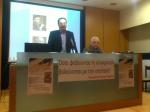Associated Press
NEW YORK — Argentina got some breathing room
Wednesday in its billion-dollar debt showdown as an appeals court
indefinitely suspended a federal judge's ruling that threatened to push
the country into default.
The two-paragraph appellate court order sets a Feb. 27 date for oral
arguments in the case, averting a Dec. 15 deadline for a $1.3 billion
payment that Argentina has refused to make despite losing its case
against NML Capital Ltd., an investment fund that specializes in suing
over unpaid sovereign debts.
Judge Thomas Griesa had ordered the government of President Cristina
Fernandez to pay the money into an escrow account even as it pursued its
final appeals. The 2nd U.S. Circuit Court of Appeals stayed that order,
giving all parties in the case two more months to prepare for hearings.
Fernandez called the ruling by Griesa "judicial colonialism" and said
she won't pay anything to what she calls "vulture funds." She said that
if it was allowed to stand, the judge's ruling would give financial
speculators a huge advantage over countries that need to restructure
debts and protect their citizens as they grow their way out of economic
crises.
Griesa's order threatened to set off a crisis as lawyers representing
other holders of defaulted debt, totaling more than $11 billion, were
expected to demand immediate payment as well.
His ruling in favor of a fund run by billionaire Paul Singer and
other plaintiffs was issued just before the long Thanksgiving weekend,
and the consequences for Argentina since then have been severe.
The cost of maintaining Argentina's overall debt soared in trading on
U.S. and European bond markets, and the cost of insuring the debts
through credit default swaps spiked. Fitch's Ratings Service downgraded
Argentine bonds, already considered junk, to one step above default,
predicting the government won't pay. Those and other reactions made
borrowing even more expensive for any company operating in Argentina,
and analysts were predicting more social upheaval as credit dries up and
the country's recession deepens.
Fernandez said the ruling was particularly unfair since Singer and
other holdouts refused two opportunities to swap the debt left over from
Argentina's world record 2001 default with new bonds, which the
government















 Το νόμισμα είναι από τα προβλήματα της ελληνικής οικονομίας, όχι όμως το βασικότερο. Το είχαμε γράψει και στο “
Το νόμισμα είναι από τα προβλήματα της ελληνικής οικονομίας, όχι όμως το βασικότερο. Το είχαμε γράψει και στο “





















